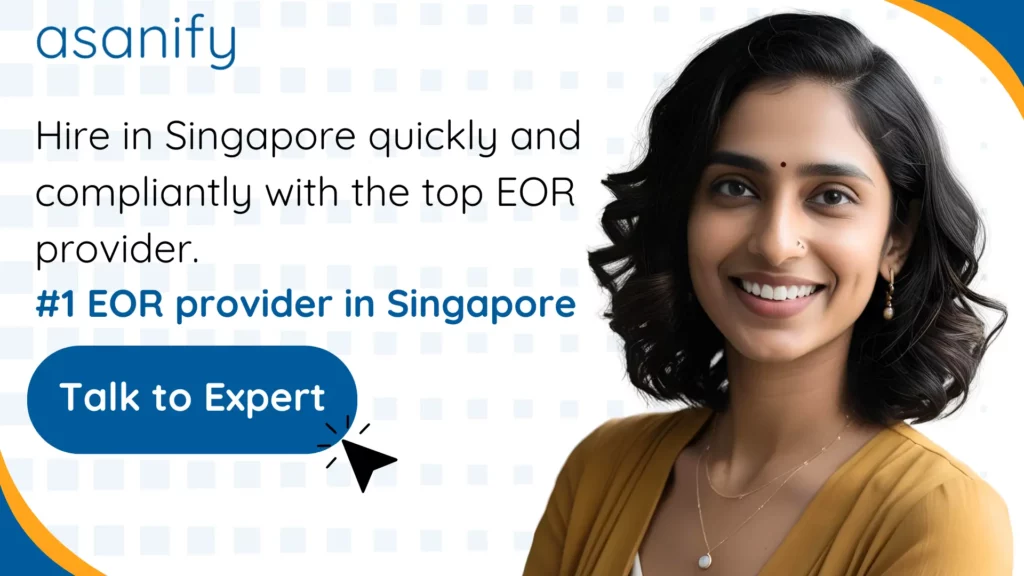Remote hiring in Singapore is rapidly becoming a top choice for global companies thanks to its pro-business environment, highly skilled workforce, and robust legal infrastructure. An Employer of Record (EOR) in Singapore plays a critical role in simplifying this process. One of the most important early steps is creating and sending a compliant job offer letters.
This guide walks you through all the steps, legal nuances, and best practices for issuing a job offer letter through an EOR when hiring remote employees in Singapore.
Table of Contents
- Job Offer Letter & Onboarding Flow for a Remote EOR Employee
- Offer Letter vs Employment Contract in Singapore
- When Should a Job Offer Letter Be Issued?
- What Salary Should Be Included in a Singapore Job Offer Letter?
- Job Offer Letter Checklist for Singapore
- FAQs
- Conclusion
Key Takeaways
- Learn the importance of offer letters in Singapore EOR hiring
- Understand MOM, CPF, and Employment Act compliance
- Follow a step-by-step job offer and onboarding checklist
Job Offer Letter & Onboarding Flow for a Remote EOR Employee
Hiring via an EOR in Singapore follows a shared responsibility model between your company and the EOR partner:
- Candidate Selection – The employer selects the ideal candidate.
- Offer Drafting – Employer prepares the offer with basic terms.
- EOR Review – EOR localizes the offer in compliance with Singapore’s Employment Act.
- Candidate Acceptance – The candidate accepts the offer.
- Employment Contract – The EOR issues the formal employment agreement.
- Government Registration – EOR manages CPF, tax ID (IRAS), and Ministry of Manpower filings.
Offer Letter vs Employment Contract in Singapore
- Job Offer Letter: A non-binding document that confirms employment terms and intent.
- Employment Contract: Legally binding under the Employment Act. Must include salary, benefits, probation, termination terms, and CPF obligations.
While the job offer confirms mutual interest, only the signed contract legally defines employment in Singapore.

When Should a Job Offer Letter Be Sent?
Here’s the expanded version of the best practices for sending a job offer in Singapore:
- Issue the offer letter within 24–48 hours of the final interview
Timely communication demonstrates professionalism and maintains candidate engagement. - Include a clear response deadline
Typically 3 to 5 business days allows the candidate time to review, while keeping your hiring timeline on track. - Provide a contact point for queries
Mention the HR representative or Hiring Manager’s name, email, and phone number to support transparent communication. - State a tentative start date
Align expectations early by sharing the proposed joining date, subject to final agreement and documentation. - Summarize key benefits
Briefly highlight major benefits such as CPF contributions, health insurance, leave policies, and any additional perks. - Follow up promptly if needed
Proactive communication improves candidate conversion rates and reflects positively on your employer brand.
Suggested Read: EOR Singapore: A Detailed Guide 2025
What Salary Details Must Be in the Offer Letter?
Here’s the expanded version of the salary section, presented in pointers for clarity and compliance with Singapore hiring norms:
- Present salary as gross monthly
This is standard practice in Singapore and ensures clarity for both parties. - Breakdown of fixed vs. variable pay
Specify base salary and detail any performance-based components like bonuses, commissions, or incentives. - CPF contributions
Clearly outline both the employee (20%) and employer (17%) CPF portions, indicating their impact on take-home pay and retirement savings. - Leave entitlements and working hours
Include statutory annual leave, medical leave, and expected weekly working hours to comply with the Employment Act. - Optional: Net pay estimate
For transparency, you may provide an estimate of net salary after CPF deduction—though not mandatory, it improves candidate understanding. - Ensure clarity for payroll processing
Precise and complete salary details help streamline payroll onboarding and minimize disputes or delays.
Job Offer Letter Checklist for Singapore
Here’s the expanded list of components to include in a compliant job offer letter for remote employees in Singapore, especially when hiring through an Employer of Record (EOR):
- Job title and role description
Clearly state the position and a brief overview of duties and responsibilities. - Start date and working hours
Mention the official start date, standard weekly hours, and any shift requirements. - Monthly gross salary and bonus structure
Include fixed salary, variable components like bonuses or commissions, and clarify payment frequency. - CPF contributions and statutory benefits
Highlight mandatory CPF contributions (20% employee, 17% employer) and include information on paid leave, medical benefits, and insurance. - Work location (including remote arrangements)
Specify if the role is remote or hybrid and include the official location for legal compliance. - Probation period and contract duration
Outline the length of probation and total contract term (e.g., fixed-term or permanent). - Offer validity and response deadline
Provide a specific date by which the candidate must respond to accept the offer. - Employer and employee contact details
Include names, designations, and email addresses for both parties for formal communication.

Conclusion
Creating and sending a compliant job offer letter is essential when hiring remote employees in Singapore through an Employer of Record (EOR). With Singapore’s strict Ministry of Manpower (MOM) guidelines and mandatory CPF contributions, it’s crucial that the offer letter aligns with legal requirements. A clear, well-structured offer sets accurate expectations, builds trust, and supports smooth onboarding. EOR providers like Asanify help global companies manage the entire process—drafting localized offers, ensuring MOM compliance, handling CPF setup, and guiding employment contracts. Whether you’re hiring your first remote team member or expanding across Southeast Asia, a reliable EOR simplifies the process and ensures full legal alignment from day one.
Suggested Read: Pay Contractors in Singapore: A Complete Guide to the Hiring Process
FAQs
No, only the signed employment contract is legally enforceable.
The Employment Act, and the Central Provident Fund (CPF) Act.
Yes, for Singaporeans and PRs. Not required for foreigners on EP or S Pass.
Yes, both performance-based and fixed annual bonuses are allowed.
English is standard and legally valid in Singapore.
Usually 1 month, though it may range from 1 week to 3 months based on contract terms.
Yes, if no employment contract has been signed yet.
1 to 3 months is standard; must be mentioned in both offer and contract.
No. EORs only support legal full-time employment—not independent contractors.
CPF, paid leave, bonuses, medical insurance, remote equipment if applicable.
Yes. They handle IRAS registration, CPF deductions, and salary disbursement.
EOR is the legal employer; PEO may not have local authority to hire legally.
Work with an EOR like Asanify that keeps salary structures MOM-compliant.
Not to be considered as tax, legal, financial or HR advice. Regulations change over time so please consult a lawyer, accountant or Labour Law expert for specific guidance.

